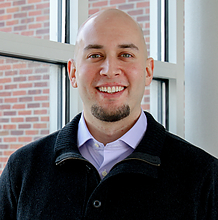 A University of Maryland expert on network security has been chosen to serve on a national forum focused on emerging critical challenges to the nation’s IT infrastructure.
A University of Maryland expert on network security has been chosen to serve on a national forum focused on emerging critical challenges to the nation’s IT infrastructure.
Dave Levin, an assistant professor of computer science and core faculty member in the Maryland Cybersecurity Center, will join 23 other scientists and policy experts serving on the Forum on Cyber Resilience.
The forum—managed by the National Academies of Sciences, Engineering and Medicine—brings together scientists, practitioners and policymakers to address a suite of issues related to cyber resilience, including the strength and vitality of the U.S. information and communications infrastructure.
Through public meetings, workshops and published reports, the forum disseminates valuable information to interested stakeholders—both in government and the private sector—on topics that include:
- traditional notions of cybersecurity and trustworthiness such as maintaining security in the face of attacks, resistance to degradation, and the ability to recover from adverse events,
- ways to foster resilience in the face of natural and man-made disasters, disruptive technological change, and diverse and dynamic user populations,
- how to sustain capacity for innovation and adaptation and the ability to absorb rapid technological disruption, and
- ways to reflect the values—such as privacy, openness, trust, expression, usability, dignity, access—and needs of the infrastructure’s many stakeholders.
“I am honored to be asked to participate for a two-year term on the Forum on Cyber Resilience,” says Levin, who also has an appointment in the University of Maryland Institute for Advanced Computer Studies. “The forum has an amazing group of scientists and practitioners onboard, and its work is deemed valuable by policymakers in Washington, D.C., meaning it can have real impact.”
Levin’s own research focuses on empirically measuring security on the internet to understand how security breaks down. He applies economics and cryptography to design and build new systems with provable and usable security.
He is also active in the use of artificial intelligence algorithms to automatically overcome state-sponsored internet censorship in countries like China, India and Kazakhstan.
—Story by Melissa Brachfeld